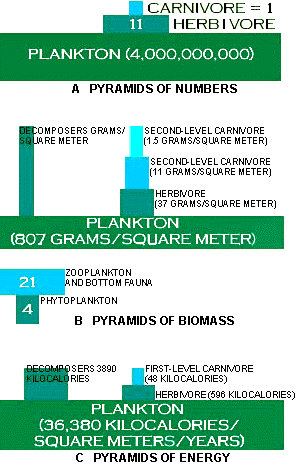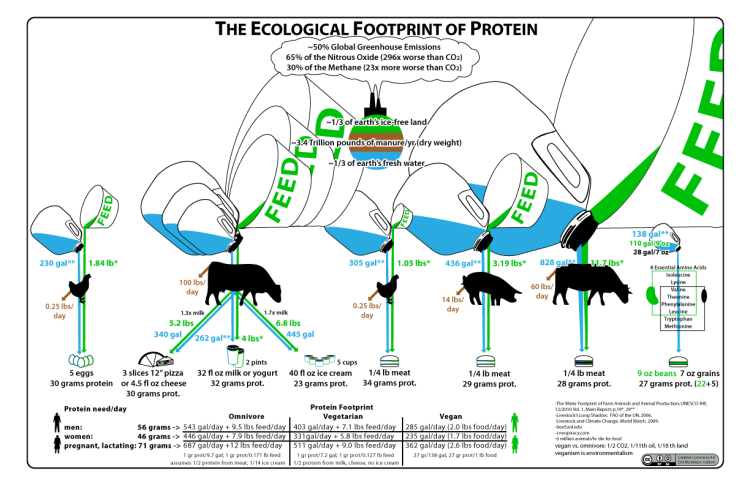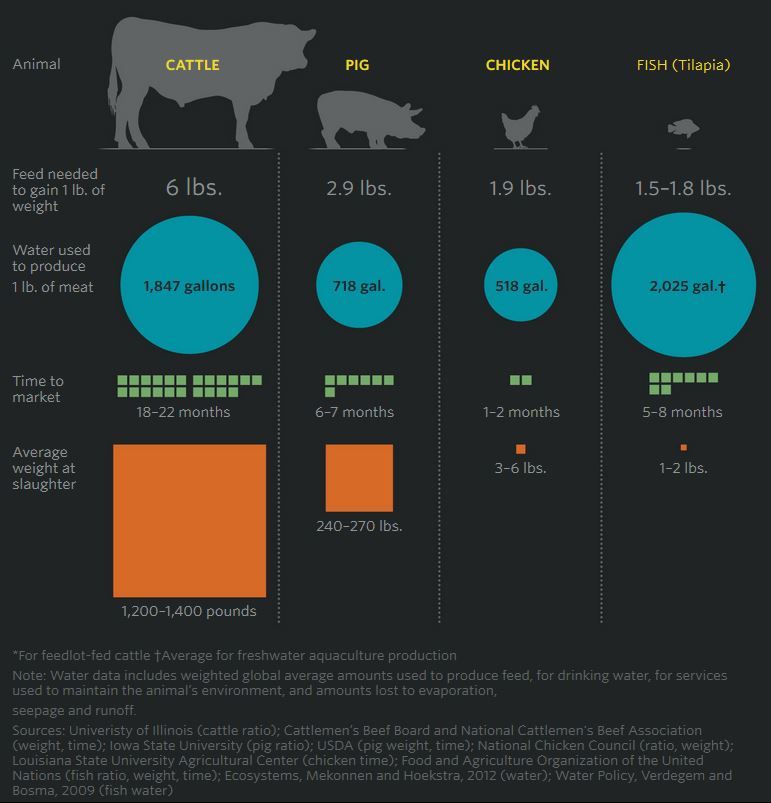What you eat is a journey, that is why it’s on this site. Plus, I often get asked, “Why are you a vegan?” It’s my journey, it doesn’t have to be yours.
I usually don’t like to talk about why I’m vegan because if the inquisitor is not vegan it can sometimes become an affront as there is really nowhere to go except to point out subtly, or directly, that veganism is an ethical and environmental stance “better than” a diet that includes meat and/or dairy (or so I think). That said, below is a list of reasons why I am vegan, not necessarily in order of importance. A small portion of these may be “confirmation bias,” but it’s not as if any reader shouldn’t consider that as a possibility from any and all angles (or for any and all ideas). As Arthur Stanley Eddington noted: “For the truth of the conclusions of science, observation is the supreme court of appeal.” With the exception of the ethical reasons for being vegan, the rest has some basis in “science.” The combined ideas below, for me, are appealing reasons for being vegan, so that’s what I am.
First, this is not why, but when: I gave up every kind of meat, except chicken and fish, in 1985/7. At the time, perhaps my junior high school year, I did it for ethical and religious reasons. I stopped consuming all meat in January of 1991, my first year at the University of Arizona. At that time, no longer religious or spiritual, I stopped mostly because I just finished reading the books Diet for a New America and Diet for a Small Planet. I’m guessing that today other books and films have inspired others similarly (e.g. Cowspiracy, Proteinaholic, Speciesism, or Comfortably Unaware). On my 15th year anniversary as a vegetarian, January 2006, I gave up eggs, milk, and cheese completely, beginning my life’s journey as a vegan to “first, do no harm.”
- ETHICS
- Is consistency a basis for ethics? How fine is the line between killing and murdering? Between eating a cow, chicken, deer, or fish etc. vs. eating a dog, cat, or human?
- Animals are often intelligent, but is it ethical to use intelligence as a factor for determining if a species should live or die? Why not kill and eat old people with dementia, babies, or developmentally disabled people in that case?
- Is veganism a means to nurture an entire “system” or mindset where “do no harm” is the praxis, and the world is “better” for it?
- Liking the “taste” of meat or dairy is not sufficient to convince me that essentialism and speciesism are morally justified. A nutritional desire, is not a nutritional “need.”
- Because it is possible to live off plants alone, a diet with meat could be considered a diet of luxury or excess.
- Why treat some, and not all, living beings like “someone” rather than “some thing”? Is the “moral community” only a human community, or does it extend beyond humans?
- Animals are sentient (have a nervous system– feel pain and fright). Is it ethical to use pain perception as a factor for determining if a species should live or die? How should killing and using resources for food be approached: empathy vs. compassion, or indifference? (perhaps excluding clams and some insects)
- “The animals of the world exist for their own reasons. They were not made for humans any more than black people were made for white, or women created for men. This is the gist of Ms. Spiegel’s cogent, humane and astute argument, and it is sound.” Alice Walker’s preface to Marjorie Spiegel’s 1988 book, “The Dreaded Comparison”
- Sam Harris, Richard Dawkins and the extra burden on moral leaders
- Did “we evolve to” eat meat or “evolve while” eating meat… ? Big difference, as the “to” is used as a lever to justify a “need” that does not exist. Will evolution stop if we stop eating meat? Carbohydrates may have been more important for the evolution of our brains than meat. Regardless, arguments citing “evolution” and history/culture are poor arguments for trying to justify an anachronistic and wasteful lifestyle with unnecessary negative externalities: waste in the form of input/output inefficiency, pollution, large(r) carbon and water footprints, and unnecessary harm and death (sometimes through (callous) indifference). These are not necessary. We can walk away from that past and keep evolving. Science and hundreds of thousands of vegans can attest to this. Why not move towards a life where we have evolved beyond the barbarity of the past to stand more upright, more modern, than we ever have been on our journey forward?
- Although it’s hard to exist without consuming products or services that have no negative externalities associated with them, that does not mean we should give up altogether in doing our best to “do no harm.” To eat meat is to commit to do harm (directly and indirectly).
- Factory farming is barbaric, if not criminal (especially factory chicken farming, and battery cages).
- Fish? Are Trout Too Smart To Eat?, Fish Are Smart (And Of Course They Feel Pain!)
- Shellfish pain
- Farm to Fridge video – The Truth Behind Meat Production
- Essentialism, Intersectionality, and Veganism as a Moral Baseline
- Milk
- Dairy cows give birth once a year as a result of artificial insemination, and sometimes they are forced to conceive via “rape racks,” or pens and ropes so they can’t escape unwanted advances.
- Two to three months after calving, a cow is impregnated again to continue the milk stream, and what amounts to the theft of milk intended for a Bos taurus calf, not homo sapiens.
- “Calves born to dairy cows, whose primary purpose in being born is to induce lactation, are taken away either immediately after birth or within a [few] day[s] or so. This separation causes great distress to the mother, who would normally feed the calf more than a dozen times a day and, like other mammals, forms a strong bond with her young soon after birth.
- Male calves are typically killed or sent off to be raised for veal or beef.
- Female calves become dairy cows like their mothers; frequent replacement of herd members is necessary because the death rate of dairy cows is very high. Cows’ natural life expectancy is 20 years or more, but the average dairy cow lives just 3 to 4 years, exhausted by constant lactation…”
- ENVIRONMENT
- The ecological footprint of a vegan is much smaller. (PDF of the info graphic below: ecological-footprint-of-protein).
- Each trophic level transfers ~10% of the energy to the next trophic level. Eating meat is inefficient, if not an anachronism, as it’s a roundabout/wasteful means to obtain protein compared to primary consumption.

- A vegan diet will help end hunger because it is more efficient means to protein as the infographic below depicts.

- Meat and the environment: Scientific American, Time, Guardian, NPR, PETA
- What is Meat? Changing the Answer Might Change the Planet.
- Meat, and the market’s demand for cheap meat, is the primary reason the rain forests are being felled.
- 10 scary facts about meat and the environment
- The use of Krill for livestock feed and human consumption compounded by an increase in oceanic CO2 threaten krill, and the balance of life in the ocean, and on land. see: Do krill need to be protected from human over-hunting? More on ocean acidification: here.
- The number one thing each of us can do to protect biodiversity
- Meat production uses resources that could be used for other purposes, or not used at all:
- land, up to 1/3 of earth’s ice-free land
- petrochemicals, used in processing, shipping, storing, and bringing the final product home (1/3 of the raw materials and fossil fuels used in the US)
- electricity, to process, and refrigerate and/or freeze (not to mention advertise)
- water, up to 1/3 of all of earth’s fresh water
- Depending on the weather, one cow drinks ~30-45 gallons/day! This does not include the water used at slaughter or to clean-up after them. This does not include the water used to raise and harvest any feed they may consume either.
- A single hamburger = enough gas to drive a small car ~20 miles
- Waste from livestock in the U.S. is ~130 times that produced by people. In central California, 1,600 dairies produce the feces and urine of a city of 21 million people.
- Grazing has decimated millions of acres of land, with desertification, erosion, manure, and non-native invasive plants and grasses that have destroyed native ecosystems. Eating meat is tied to felling trees, decimating landscapes, and polluting water.
- Over-fishing has decimated our oceans and some species have been pushed to the brink of extinction.
- I’d rather see people hunt than partake in the factory farm terror-dome, but earth could only support about 135 million hunter-gathers, or paleo-like diets. (Why the Paleo Diet Is Half-Baked)
- Our “Human Ancestors Were Nearly All Vegetarians.” Gathering is one thing, hunting is an ordeal. Insect consumption seems like a more more readily available source of nutrition.

- A vegan diet will help end hunger because it is more efficient means to protein as the infographic below depicts.
- HEALTH
- It is possible to live a nutrient rich healthy life without consuming animal products, i.e. products that result in the direct harm, torture, captivity, and death of another sentient species (perhaps excluding clams and some insects).
- 70 % of the antibiotics used in the U.S. are for meat production– promoting the selection of antibiotic-resistant bacteria, a ticking time-bomb that may give us another swine flu epidemic or fuel the avian (bird) flu.
- Since homo sapiens left the hunter-gather stage and began agriculture and animal husbandry on a large scale (about ~10,000 years ago) our relationship with animals changed, including our diseases…since about ~10,000 years ago, due to our new close relationship with animals, humans have suffered many diseases, illnesses, and epidemics that have an animal origin (see 3, 4 below).
- What are the most common food borne diseases? They don’t come from plants, they come from animal husbandry.
- Non-human animal diseases are many, and can be transferred to humans, even from pets: Zoonoses
-
Jane Goodall: Animal Agriculture, Climate Change, & Why She’s a Vegetarian

gross-things-meat-infographic:

Pingback: Are we born to run? | Trailism